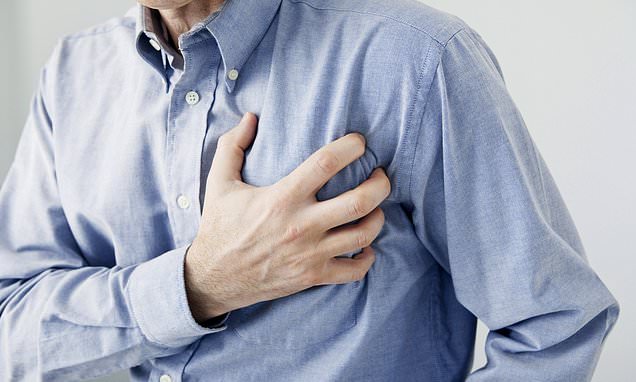
A stressful marriage can literally break your heart: Study finds unhappy couples are 50% more likely to be readmitted to hospital after a heart attack
- They were also 67% more likely to report chest pains in year following an attack
- Romantics know that previous studies have linked tying knot with good health
- Scientists wanted to test if long-term relationships were a help or hinderance
It will come as little surprise to many but stressful marriages really can take a toll on your heart.
Couples who are unhappy in their relationships are half (50 per cent) more likely to be readmitted to hospital following a heart attack, a study found.
They were also 67 per cent more likely to report chest pains in the year following an attack than those who had little or no stress in their marriage, according to research from Yale University.
Romantics will know that previous studies have linked tying the knot with better overall health and heart disease prognosis.
But scientists wanted to test if a being in a long-term relationship could be a help or hinderance after a heart attack.
They looked at the recoveries of more than 1,500 adults, with an average age of 47, one year later and compared it to how happy they were with their spouses.

Couples who are unhappy in their relationships are half (50 per cent) more likely to be readmitted to hospital following a heart attack (file image)
Following a ‘fashionable’ fast for just one week can damage the heart, research suggested in February 2018.
Obese people who suddenly lower their calorie intake to just 600-to-800 units a day, experience heart-fat level increases of 44 per cent, a trial found.
Despite such dieters on average losing six per cent of their total body fat after just seven days, this fat is released into their bloodstream and absorbed by their hearts, the researchers explained.
Although this excess heart fat balances out by week eight of dieting, for people with heart problems, it could leave them breathless and with an irregular beat, the Oxford University scientists added.
The researchers analysed 21 obese volunteers with an average age of 52 and a BMI of 37kg/metre squared.
The study’s participants ate a very low-calorie diet every day for eight weeks.
MRI scans were taken at the start and end of the investigation, as well as after week one.
Participants were asked to complete questionnaires on subjects including the quality of the emotional and sexual relationship before being rated as either having absent/mild marital stress, moderate marital stress or severe marital stress.
Scientists then used a point scale to assess their physical health, pain scores, mental well-being as well as hospital data to monitor any readmissions.
Some four out of ten women and three in ten men reported severe marital stress, according to the findings presented at American Heart Association’s Scientific Sessions 2022.
Participants with severe stress scored more than 1.6 points lower in physical health, and 2.6 points lower in mental health, out of a total of 12.
Those with most stress reported 8 points lower in quality of life when measured by a scale specifically designed for cardiac patients.
They were 67 per cent more likely to report chest pains than people with mild or no marital stress and 50 per cent more likely to be readmitted to hospital for any cause.
There are up to 100,000 hospital admissions each year due to heart attacks in the UK – the equivalent of one every five minutes.
Every year, abut 800,000 people in the United States have a heart attack.
Lead author Cenjing Zhu, from the Yale School of Public Health, Connecticut, said the findings showed that personal lives can play a major role in people’s recoveries.
‘Our findings support that stress experienced in one’s everyday life, such as marital stress, may impact young adults’ recovery after a heart attack,’ she said.
Additional stressors including financial strain or work stress, may also play a role in young adults’ recovery, she said, adding: ‘Future efforts should consider screening patients for everyday stress during follow-up appointments to help better identify people at high risk for low physical/mental recovery or additional hospitalisation.
‘A holistic care model built upon both clinical factors and psychosocial aspects may be helpful, especially for younger adults after a heart attack.’
Source: Read Full Article